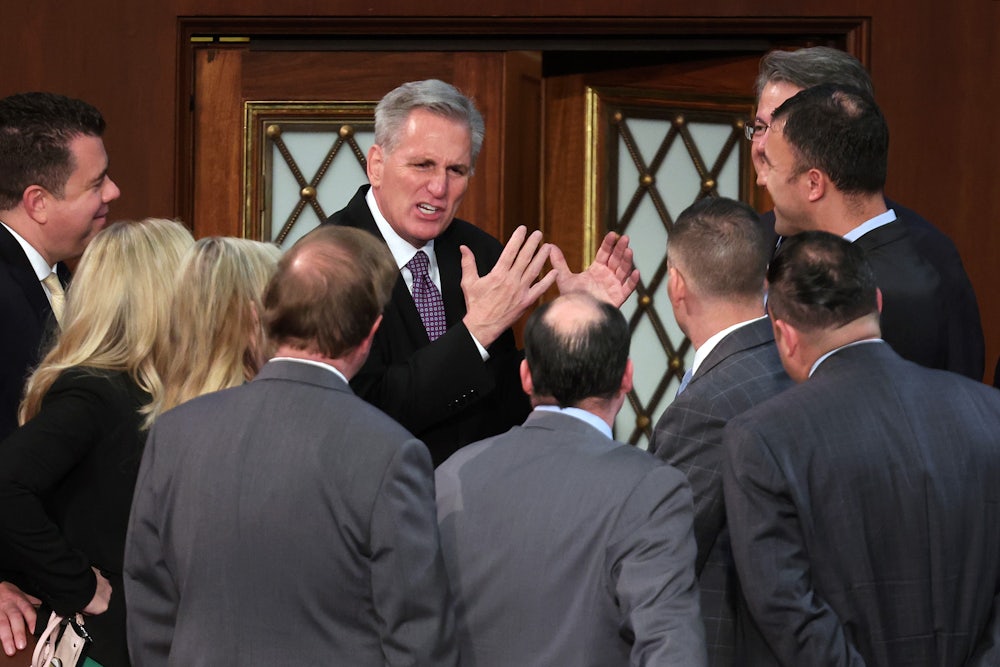It makes eminent sense that Fitch, one of the “big three” credit-rating firms designated “nationally recognized” by the Securities and Exchange Commission, downgraded U.S. Treasurys on the same day that a federal grand jury indicted former President Donald Trump for trying to overturn the 2020 election. “There has been a steady deterioration in standards of governance over the last 20 years,” said Fitch. No kidding. Actually it’s been more like 40 years, with the steepest decline over the past seven, climaxing in early 2021 with what the Trump indictment describes (accurately) as Trump’s “conspiracy to impair, obstruct, and defeat the federal government function through dishonesty, fraud, and deceit.”
Fitch wasn’t referring explicitly to January 6, of course, but it’s all part of a single narrative that begins with Ronald Reagan declaring “Government is the problem” in January 1981 and Republicans trying to sabotage the executive branch ever since through insolvency, privatization, mismanagement, hyperpartisanship, delegitimization of regulatory authority, and finally, on January 6, outright insurrection. According to The Wall Street Journal, Fitch staff, in their discussions with Biden administration officials, “repeatedly raised the events of Jan. 6, 2021.” In the downgrade document, Fitch didn’t mention January 6 because that would have sounded partisan, but that dark day was pretty obviously on its mind.
The main specific Fitch cited was “repeated debt-limit political standoffs and last-minute resolutions” that “have eroded confidence in fiscal management.” Can anyone dispute with a straight face that, here too, the blame lies with Republicans? The two big debt limit fights occurred in 2011 and 2023. In both instances, Republicans had just regained control of the House of Representatives and narrowed Democratic majorities in the Senate. In both instances, the GOP was itching to flex its muscles against a Democratic president with a presidential election one year away. In both instances, events were driven by extremist members of the GOP—Tea Partiers in 2011, the Freedom Caucus in 2023—who called for catastrophic (and economically destabilizing) cuts to the federal budget, and professed indifference (at least some of them) to the prospect of forcing a default on U.S. debt. In both instances, the Republican motive was performative to the point of undermining stable governance. And in both instances, a big-three credit-rating firm ended up downgrading the credit of the U.S. government—Standard & Poor’s in 2011, Fitch this week. (The third big-three firm, Moody’s, threatened a downgrade in 2011 but did not carry it out.)
Democrats are denouncing Fitch’s decision. “Arbitrary and based on outdated data,” said Treasury Secretary Janet Yellen. “Bizarre and inept,” said Harvard economist Larry Summers. “Doesn’t make sense,” said the Nobel laureate Paul Krugman of The New York Times.
These eminences are right, perhaps, on technical grounds. As Yellen pointed out, Fitch’s quantitative ratings model for the United States declined from 2018 to 2020 but has improved since then. The debt-to-GDP ratio, Fitch concedes, fell during the past two years. Fitch predicts a “mild recession” in the fall, even as all economic indicators suggest that the economy is thriving and most other analysts have switched to a more hopeful forecast. To whatever extent Fitch’s downgrade is based on a perceived weakness in the economy, that’s just wrong. The economy is in excellent shape.
But embedded in the Fitch document is the unspoken presumption that Republicans will continue to undermine economic governance. “I’m mad as hell,” said University of Michigan economist Justin Wolfers, “because it’s the direct result of a multi-decade campaign of fiscal vandalism and political sabotage by Republicans, and the rest of us are left footing the bill.” Why should the downgrade occur now when we know Republicans have been laying waste since 1981, and especially since 2017? Is it fair that this lousy grade should appear on President Joe Biden’s report card when Biden has been managing the economy in such exemplary fashion?
But Wolfers (and Yellen and Krugman and Summers), brilliant economists though they all are, are making an error that should be obvious to any first-year student in political science. Biden is not the government. They talk as though Fitch were grading the Biden administration, but Fitch is actually grading all three branches, two of which are largely controlled by Republicans, at a time when Republicans are completely out of control.
There’s the federal judiciary, which, thanks to a breakneck pace of Democratic appointments since 2021, is majority-Democratic (by which I mean the majority were nominated and confirmed during Democratic presidencies, a rough proxy for judicial philosophy). But weighing heavily against the Democrats’ overall advantage is that the appeals courts are still majority-Republican and, most glaringly, the Supreme Court has a Republican supermajority of 6–3. The Supreme Court is more conservative than it’s been for nearly a century, and in various ways that’s economically destabilizing. To cite just one example, the high court’s June decision striking down affirmative action in college admissions risks increasing economic inequality by race, which may disrupt the broader economy. At the very least, the decision is already creating havoc at the nation’s colleges and universities.
Then there’s Congress, where Democrats have a slender majority in the Senate and Republicans have a slightly larger majority in the House. The debt ceiling fight demonstrated how much damage the GOP can do. It’s a near certainty that, when the fiscal year ends September 30, House Republicans will refuse to pass appropriations bills or a continuing resolution and force a government shutdown. Is Fitch supposed to ignore that? What about January 1, 2025, when Biden must persuade Congress to raise the debt ceiling again? If he’s a lame duck, perhaps the House will let him off the hook in the interest of preparing the way for a Republican presidency. But if Biden is reelected, the Republican House will be baying for his blood.
Finally, there’s the White House, where yes, the president has been managing the economy ably. But Biden has managed Republican threats to the economy less well. In November and December 2022, Biden gave up on trying to raise the debt ceiling while he still had Democratic majorities in the House and Senate. It would have been difficult; Senator Joe Manchin, Democrat of West Virginia, would likely have defected to the Republicans, and others might have too. But cutting a deal then would have spared Biden having to negotiate later with intransigent House Republicans. Yes, it’s generally accepted that Biden outmaneuvered House Speaker Kevin McCarthy. But if Biden had cut a deal in November or December 2022, he might have been negotiating instead with Nancy Pelosi.
According to a July 31 report by Adam Cancryn and Jennifer Haberkorn in Politico, Biden isn’t exactly knocking himself out to prevent another debt ceiling crisis after the 2024 election. He’s assembled a team chaired by White House counsel Stuart Delery and National Economic Council director Lael Brainard to study legal and policy options, Politico reports, but “there’s no clear timeline for the project and little in the way of overt direction.” The Politico story quoted Representative Pramila Jayapal, Democrat of Washington, warning what Fitch is very likely thinking: “We are going to get pummeled on this over and over and over again.” Meanwhile, the Biden administration, inexplicably, has moved to dismiss an ingenious lawsuit brought against Biden and Yellen by the National Association of Government Employees that argued the executive branch lacks any authority to plan for contingencies in the event that the debt ceiling is breached—an argument that, in effect, would nullify the debt ceiling itself. The administration’s motion said the lawsuit was mooted by the debt ceiling bill that Biden signed into law on June 3. It’s mystifying why Biden would do this. The lawsuit could only have helped Biden’s argument that attempts to use the debt limit to leverage concessions are illegitimate and at odds with constitutional law.
The Trump indictment doesn’t tell us anything we didn’t already know about the federal government’s instability, owing to Republican schemes to subvert elections that most Republican members of Congress are too scared to disavow. But it’s a useful reminder that all is not well. I don’t believe the GOP will succeed in overthrowing democracy. Indeed, I don’t believe that Donald Trump, though he may get the Republican nomination, will ever again be elected president or seize the White House by extralegal means. This is a fight that the bad-guy nihlists, I think, are going to lose.
But the bad guys aren’t guaranteed to lose, and they’ve already created enough of a ruckus to compromise the credit of the United States. To the extent the deficit remains a problem in the future, it will be because Republicans refuse to apply one of two available tools to bring it under control, namely, tax increases. Only Democrats recognize that deficit reduction requires both tax increases and spending cuts. In downgrading the U.S. from triple-A to AA+, Fitch is merely acknowledging the Republican chaos we’ve all witnessed. If, in doing so, Fitch persuades the government and its citizens to guard the institutions of government more forcefully against the GOP, then bully for Fitch. My only regret is that Fitch won’t pin the blame explicitly on the political party that’s necessitated the downgrade. It sure as hell isn’t the Democrats.






